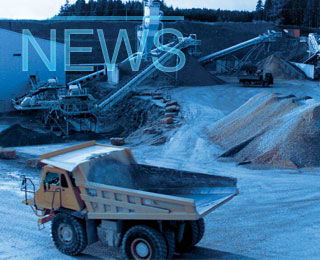In line with the aim of many west African countries, Gabon is quickly establishing itself as a self-sufficient producer rather than a prominent importer. This week, Moroccan company Ciments de l'Afrique (CIMAF) formally inaugurated a new 0.5Mta plant at Owendo as more foreign investment into domestic cement sector is rapidly converted into new capacity.
The current cement players
The established player in Gabon for many years has been Cimgabon, which was 75 per cent owned by HeidelbergCement and 25 per cent owned by the state. CIMAF acquired HeidelbergCement's share in Cimgabon in 2014 and closed the wet-process plant at N'Toum as raw materials ran out. Today, CIMAF operates in Gabon under its associate company CIMAT and still runs the former 0.4Mta former Cimgabon grinding unit at Owendo.
Plans for more capacity to be built in Gabon are being considered, and CIMAT's parent company, Addoha Group of Morocco, announced last summer that it was considering a 0.5Mta grinding plant at Libreville.
However, the wildcard is Dangote Industries Gabon SA, which had aimed to build a 1.5Mta greenfield plant as far back as 2011. This is now understood to have been scaled down to a 1Mta grinding plant, although there is no news of construction starting yet.
2016 presidential election
The political situation in Gabon is dominated by the upcoming presidential election in August, when Jean Ping will challenge the incumbent President Ali Bongo Ondimba. There are newspaper reports that Ping’s campaign is to be funded by Dangote owner and billionaire Aliko Dangote, in an effort to gain influence and favourable investment terms. Mr Ping is keen on advocating public-private partnerships and this may yet be the best way in for Dangote.
Earlier in June, Aliko Dangote also made an agreement with The African Export-Import Bank (Afreximbank) to finance supply chains across Africa to promote intra-regional trade. Gabon is certainly a market where Dangote would like to do more business and it is opening up avenues to fund such initiatives.
Oil dependence
OPEC member Gabon has substantial oil reserves, with some 500Mt recoverable over the next 50 years, according to the World Energy Council. In the short term, lower oil prices have put pressure on government finances. GDP is forecast to fall to 3.2 per cent in 2016 having been at six per cent between 2010-14. Gabon depends on oil receipts for 45 per cent of public revenue and 85 per cent of exports in 2014 and diversification away from the oil sector has been recommended by the IMF.
Cement consumption and demand drivers
Per capita cement consumption in Gabon was approximately 350kg in 2014 and is on an upward curve. The country's cement consumption is approximately 0.7Mta and with the opening of the CIMAF plant, the country is hoped to reduce the need for cement imports.
Cement demand is forecast to rise as there is insufficient housing for the 1.7m population. Libreville has seen housing developments start, but the oil crisis has delayed development in the last seven years. During this period, the government has only enabled construction of 3762 housing units, which is well below the stated electoral aim in 2009, when the President asserted that the government would build 5000 units per year.
A major incentive for cement producers to increase their capacity in Gabon has been the US$100m International Bank for Reconstruction and Development loan, announced in January 2016 by the World Bank. The loan is expected to assist the government to advance its infrastructure and development agenda. The project covers new provincial capitals in Makokou, Koulamoutou and Tchibanga in addition to six previous cities that were targeted in the previous Local Infrastructure Development Project (LIDP I) – Libreville, Port-Gentil, Franceville, Oyem, Lambareené and Mouila.
The National Infrastructure Masterplan comprises 21 major projects for a six-year implementation period (2014-20) at an estimated cost of US$11.831bn. This includes investments into the mining sector (US$3.260bn), transport (US$3.530bn), power (US$3.008bn) as well as the Greater Libreville Management and Planning scheme, Mandji Island Special Economic Zone, tourism and the establishment of the National Agency for Major Works.

Indonesia cement demand continues to contract
Cement sales in Indonesia amounted to 3.842Mt in March 2025, a drop of 21.6 per cent YoY compare...